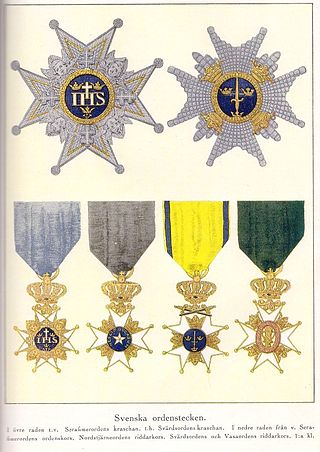
The Most Excellent Order of the British Empire is a British order of chivalry, rewarding contributions to the arts and sciences, work with charitable and welfare organisations, and public service outside the civil service. It was established on 4 June 1917 by King George V and comprises five classes across both civil and military divisions, the most senior two of which make the recipient either a knight if male or dame if female. There is also the related British Empire Medal, whose recipients are affiliated with, but not members of, the order.

Prince Carl Philip of Sweden, Duke of Värmland is the only son and the second of three children of King Carl XVI Gustaf and Queen Silvia. As of 2022, Prince Carl Philip is fourth in the line of succession, after his older sister, Crown Princess Victoria, his niece and goddaughter Princess Estelle, and his nephew Prince Oscar. He lives with his wife, Princess Sofia, and three sons, Prince Alexander, Prince Gabriel and Prince Julian in Villa Solbacken in Djurgården, Stockholm.

Grand Cross is the highest class in many orders, and manifested in its insignia. Exceptionally, the highest class may be referred to as Grand Cordon or equivalent. In other cases, there may exist a rank even higher than Grand Cross, e.g. Grand Collar. In rare cases, the insignia itself is referred to as the "grand cross".

Princess Christina, Mrs. Magnuson, is a member of the Swedish royal family. She is the fourth child of Prince Gustaf Adolf, Duke of Västerbotten, and Princess Sibylla of Saxe-Coburg and Gotha, and the youngest of the four older sisters of King Carl XVI Gustaf. She generally uses the name Christina Magnuson.

The Royal Order of the Sword is a Swedish order of chivalry and military decoration created by King Frederick I of Sweden on 23 February 1748, together with the Order of the Seraphim and the Order of the Polar Star. The motto of the order is in Latin: Pro Patria.

The Royal Norwegian Order of Saint Olav is a Norwegian order of chivalry instituted by King Oscar I on 21 August 1847. It is named after King Olav II, known to posterity as St. Olav.

The Royal Order of the Seraphim is a Swedish order of chivalry created by King Frederick I on 23 February 1748, together with the Order of the Sword and the Order of the Polar Star. The order has only one class with the dignity of Knight, and is the foremost order of Sweden.

Frederick II was the last sovereign Grand Duke of Baden, reigning from 1907 until the abolition of the German monarchies in 1918. The Weimar-era state of Baden originated from the area of the Grand Duchy of Baden.

Grand Duke Michael Nikolaevich of Russia was the fourth son and seventh child of Emperor Nicholas I of Russia and Charlotte of Prussia. He was the first owner of the New Michael Palace on the Palace Quay in Saint Petersburg.

The Royal Order of the Polar Star, sometimes translated as the Royal Order of the North Star, is a Swedish order of chivalry created by King Frederick I on 23 February 1748, together with the Order of the Sword and the Order of the Seraphim. The Order of the Polar Star is intended as a reward for Swedish and foreign "civic merits, for devotion to duty, for science, literary, learned and useful works and for new and beneficial institutions".

Oswald Samuel Konstantin Freiherr von Richthofen, a German diplomat and politician, served as Foreign Secretary and head of the Foreign Office from 23 October 1900 to 17 January 1906.

The Orders, decorations, and medals of Sweden have a historical basis, reaching back to the 1561 founding of the extinct Order of the Savior. The Royal Order of Knights of Sweden were only truly codified in the 18th century, with their formal foundation in 1748 by Frederick I of Sweden. Significant reforms in 1974 changed the conditions and criteria under which many orders and decorations could be awarded.
The Order of Saint Lucia is an order of chivalry established in 1986 by Elizabeth II. The Order comprises seven classes. In decreasing order of seniority, these are:

General Hugo Montgomery Cederschiöld was a senior officer in the Swedish Army. He served as commander of Svea Life Guards (1936–1938), as Commandant of Stockholm (1938–1945) and as Defence District Commander of Stockholm Defence District (1942–1945) and Norrtälje Defence District (1943–1945). Cederschiöld also served as Chief of His Majesty's Military Staff (1950–1963). He also competed at the 1912 Summer Olympics.

Vice Admiral Claës Olof Lindsström was a Swedish Navy officer. Lindsström's senior commands include postings as commanding officer of Karlskrona and Stockholm Naval Stations, the South and East Coast Naval District, and as Chief of the Naval Staff. Lindsström was active during the era of the Sverige-class coastal defence ships and made significant efforts to develop this type of coastal defence ship.













